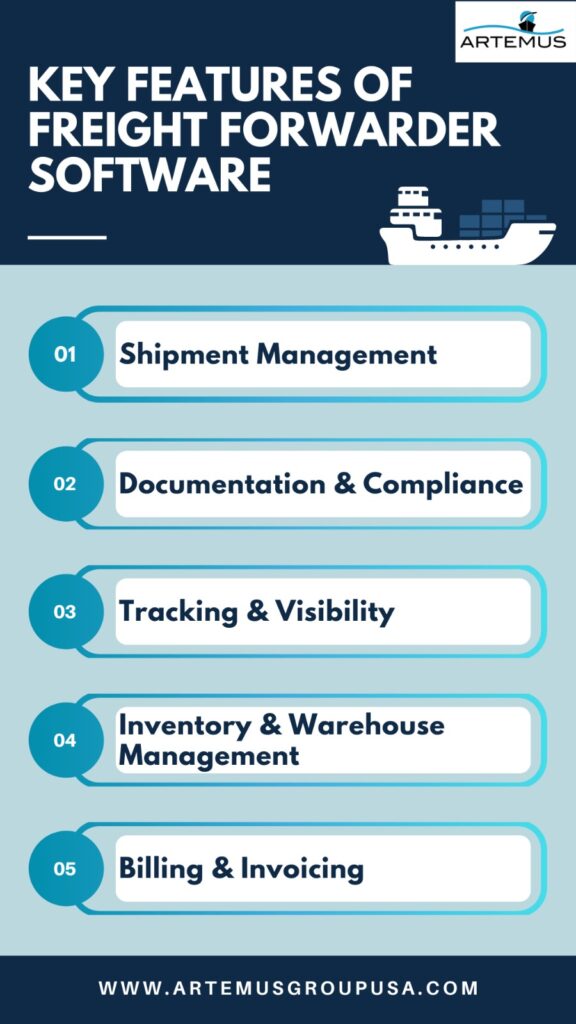
What Is Inbound Logistics & Outbound Logistics? A 2025 Guide
In the dynamic world of supply chain management, understanding the nuances of inbound and outbound logistics is crucial for operational

In today’s rapidly evolving global marketplace, the efficient movement of goods is essential for businesses to thrive. At the heart of this intricate process lies freight forwarding – the seamless coordination of shipments from origin to destination. However, as the complexities of international trade continue to grow, so too does the demand for innovative solutions to streamline logistics operations like freight forwarder software.
Moreover, Artemus Transportation Solutions stands out with its specialized Freight Forwarder Software tailored for Security Filing. With Artemus, companies can navigate the intricacies of Automated Manifest System (AMS) and Importer Security Filing (ISF) compliance seamlessly, ensuring smooth and efficient management of import shipments.
Table Of Contents
Freight forwarder software represents a pivotal advancement in the logistics industry, revolutionizing the way companies manage and execute their freight forwarding operations. But what exactly is freight forwarder software, and why has it become indispensable in today’s fast-paced global trade landscape?
At its core, freight forwarder software is a comprehensive suite of digital tools and platforms designed to streamline and optimize the processes involved in transporting goods from one location to another. It serves as the backbone of freight forwarding companies, empowering them to efficiently manage every aspect of the shipping process, from initial booking to final delivery.
One of the primary functions of freight forwarder software is shipment management. This entails the creation, tracking, and monitoring of shipments throughout their entire journey, providing real-time visibility into their status and location. Through intuitive interfaces and powerful tracking capabilities, freight forwarders can proactively address any issues or delays that may arise, ensuring smooth and timely delivery of goods to their destination.
In addition to shipment management, freight forwarder software also encompasses robust documentation and compliance features. This includes generating and managing essential shipping documents such as bills of lading, commercial invoices, and customs declarations, which are crucial for ensuring legal compliance and facilitating the smooth movement of goods across international borders. By automating these documentation processes, freight forwarder software helps minimize errors and delays, thereby accelerating the flow of goods through the supply chain.
Related: What Does A Freight Forwarder Do? Functions & Future Trends

Freight forwarder software is a comprehensive suite of digital tools designed to streamline and optimize the intricate processes involved in transporting goods across the globe. Here are five key features that distinguish top-tier freight forwarder software solutions:
Efficient shipment management lies at the heart of freight forwarder software. These platforms facilitate the creation, tracking, and monitoring of shipments from origin to destination. With intuitive interfaces and robust tracking capabilities, freight forwarders can oversee every aspect of the shipping process in real time. This includes managing bookings, coordinating logistics, and providing customers with up-to-date information on the status and location of their shipments. By centralizing and automating these processes, freight forwarder software minimizes errors and delays, ensuring smooth and timely delivery of goods.
Navigating the complex web of international trade regulations and customs requirements can be a daunting task for freight forwarders. That’s where freight forwarder software comes in, offering powerful documentation and compliance features. These platforms automate the generation and management of essential shipping documents, including bills of lading, commercial invoices, and customs declarations. By ensuring compliance with legal and regulatory requirements, freight forwarder software helps expedite the clearance of goods through customs and minimizes the risk of costly delays and penalties.
In today’s fast-paced logistics environment, visibility is key. Freight forwarder software provides comprehensive tracking and visibility capabilities, allowing companies to monitor the movement of goods throughout the supply chain. Whether it’s tracking containers on ships, parcels on planes, or trucks on highways, these platforms offer real-time visibility into the status and location of shipments. This level of visibility enhances operational efficiency and enables proactive decision-making and effective problem-solving in the event of disruptions or delays.
Effective inventory and warehouse management are essential for optimizing the flow of goods through the supply chain. Freight forwarder software includes robust inventory and warehouse management functionalities, allowing companies to efficiently track and manage the storage and distribution of goods within their facilities. From inventory tracking to order fulfillment, these platforms streamline warehouse operations, minimize stockouts, and ensure that goods are readily available for shipment when needed. By optimizing inventory management, freight forwarder software helps companies reduce carrying costs and improve overall supply chain performance.
Managing the financial aspects of freight forwarding operations can be complex and time-consuming. Freight forwarder software simplifies this process by offering integrated billing and invoicing capabilities. These platforms automate the generation of accurate invoices, track payments, and manage billing cycles, streamlining the financial workflows associated with freight forwarding. By improving billing accuracy and efficiency, freight forwarder software helps companies optimize cash flow management, reduce the risk of revenue leakage, and enhance overall financial performance.
Related: Shipment Has Been Given A Release Status By Customs
Freight forwarder software offers a multitude of benefits to companies involved in the transportation and logistics industry. Here are five key advantages of using freight forwarder software:
Related: How Long Does Customs Clearance Take? Key Takeaways
Choosing the right freight forwarder software is crucial for optimizing your logistics operations and achieving business success. Here are some key steps to help you make the right decision:
1. Assess Your Business Needs: Begin by identifying your specific requirements and challenges. Consider factors such as the volume of shipments you handle, the complexity of your supply chain, and any unique industry regulations or compliance requirements you need to adhere to. Understanding your business needs will help you narrow down your options and focus on software solutions that align with your goals.
2. Evaluate Features & Functionality: Once you’ve identified your business needs, evaluate the features and functionality offered by different freight forwarder software solutions. Look for key capabilities such as shipment management, documentation and compliance, tracking and visibility, inventory and warehouse management, and billing and invoicing. Assess how well each software solution meets your requirements and whether it offers scalability and flexibility to accommodate future growth.
3. Consider Scalability & Integration: Choose a freight forwarder software solution that is scalable and can grow with your business. Consider whether the software can handle increasing volumes of shipments and support additional users and locations as your business expands. Additionally, look for software that offers seamless integration with other systems and platforms such as transportation management systems (TMS), enterprise resource planning (ERP) software, and customer relationship management (CRM) tools. Integration capabilities are essential for streamlining workflows and maximizing efficiency across your organization.
4. Evaluate User Experience & Support: Ease of use and accessibility are crucial factors to consider when choosing freight forwarder software. Look for software solutions that offer intuitive interfaces and user-friendly features that will minimize training time and ensure smooth adoption by your team. Additionally, consider the level of customer support and assistance provided by the software vendor. Choose a vendor that offers responsive customer support, ongoing training opportunities, and regular software updates to ensure that you get the most value from your investment.
5. Consider Cost & Return On Investment: Finally, consider the cost of the freight forwarder software and evaluate the return on investment (ROI) it will deliver to your business. While cost is an important factor, it’s essential to look beyond the initial price tag and consider the long-term benefits and value the software will provide. Assess factors such as improved efficiency, reduced errors and delays, enhanced customer service, and potential cost savings and revenue optimization. Choose a software solution that offers a balance of features, functionality, and affordability, and that provides a clear path to ROI for your business.
Related: Customs Compliance Software: Key Benefits & Top Suggestions
Artemus offers cutting-edge freight forwarder software specifically tailored for Automated Manifest System (AMS) and Importer Security Filing (ISF) compliance. Our software streamlines the complex processes associated with AMS and ISF security filing, ensuring seamless and efficient management of import shipments.
With Artemus’ freight forwarder software, users can easily generate and submit electronic manifests and security filings to U.S. Customs and Border Protection (CBP) in compliance with AMS and ISF regulations. Our intuitive interface and powerful features make it easy to input and validate shipment data, generate required documentation, and submit filings accurately and on time.
Key features of Artemus’ freight forwarder software for AMS and ISF security filing include:
By leveraging Artemus’ freight forwarder software for AMS and ISF security filing, importers and freight forwarders can streamline their compliance processes, reduce administrative burdens, and mitigate the risk of compliance-related issues. With our user-friendly interface and robust features, you can trust Artemus to simplify AMS and ISF filing requirements, allowing you to focus on growing your business and serving your customers.
Related:ISF Filing: A Compliance-Related Guide & Software Solution
Freight forwarding software is a digital solution designed to streamline and automate the logistical processes involved in shipping goods from one location to another, encompassing functions such as shipment management, documentation, tracking, and compliance management.
Freight CRM (Customer Relationship Management) is a software solution tailored to the needs of freight forwarding companies, enabling them to manage interactions with customers, track leads and opportunities, streamline sales processes, and enhance customer satisfaction and retention.
To set up a freight forwarder, establish a legal entity, obtain necessary licenses and permits, secure insurance coverage, develop relationships with carriers and suppliers, implement freight management software, and establish operational procedures for shipping, documentation, and customer service.

Freight forwarder software has emerged as a critical tool for businesses navigating the complexities of global logistics. By automating processes, enhancing visibility, and improving efficiency, these solutions enable companies to streamline operations, minimize errors, and deliver superior customer service. As technology continues to evolve, embracing innovative freight forwarder software solutions will be essential for businesses to stay ahead in the dynamic and competitive world of international trade.

In the dynamic world of supply chain management, understanding the nuances of inbound and outbound logistics is crucial for operational

In today’s interconnected world, businesses rely heavily on global trade to expand their markets, access new resources, and drive growth.

Importing goods for resale in the USA presents a lucrative business opportunity, but navigating the complexities of U.S. customs regulations,
Get In Touch
Artemus’ Software Solutions for ISF, AMS, Japan AFR, eManifest Canada, & Panama B2B filings.